Teeth
Jaw Relation Simulator
“to help police investigations related to people who have been bitten by other people and who retain marks in their flesh from the experience.”

Chicago Tribune - Apr 1, 1990
Posted By: Alex - Wed Jun 05, 2019 -
Comments (5)
Category: Police and Other Law Enforcement, Teeth
Murphy the Molar
A talking tooth from Canada.More info: Lorne Park Dental
Posted By: Alex - Fri Mar 08, 2019 -
Comments (3)
Category: Video, 1970s, Teeth
Push-Button Toothpaste
Toothpaste in a shaving-cream can.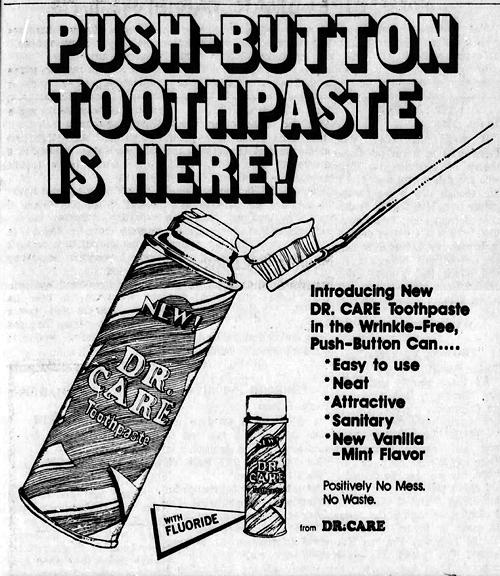
Colorado Springs Gazette - Nov 24, 1972
Posted By: Alex - Sat Jun 30, 2018 -
Comments (4)
Category: Products, 1970s, Teeth
Dentists smell fear
Recent research reveals that dentists can not only smell fear, but that when they do their job performance significantly declines. From New Scientist:Next, examiners graded the dental students as they carried out treatments on mannequins dressed in the donated T-shirts. The students scored significantly worse when the mannequins were wearing T-shirts from stressful contexts. Mistakes included being more likely to damage teeth next to the ones they were working on.
So, if your fear causes your dentist to start making more mistakes, I assume that will only increase your fear, causing your dentist to make even more mistakes, leading to a downward-spiraling cycle of terror.
The academic study is here.
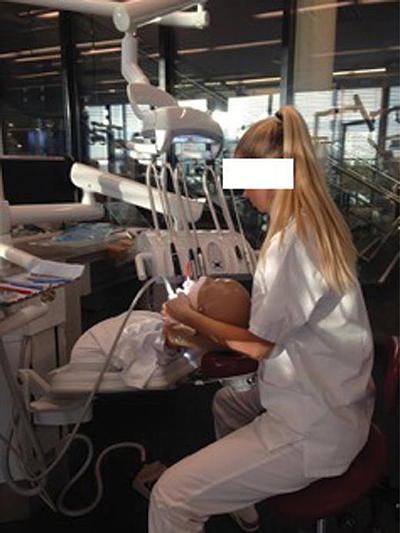
Posted By: Alex - Tue Jun 05, 2018 -
Comments (4)
Category: Experiments, Psychology, Teeth
Dentologia: A Poem on the Diseases of the Teeth
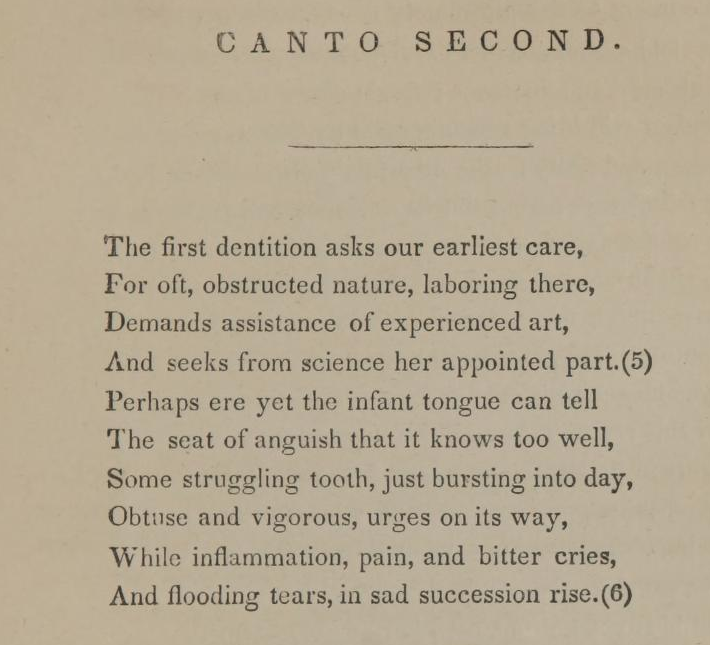
Full text here.
Thanks to Richard Bleiler.
Posted By: Paul - Fri Apr 13, 2018 -
Comments (3)
Category: Hygiene, Poetry, Nineteenth Century, Diseases, Teeth
Follies of the Madmen #348

Sadistic dentist, with an eye toward cultivating future patients, gives out candy.
Posted By: Paul - Tue Jan 23, 2018 -
Comments (4)
Category: Medicine, Advertising, 1920s, Teeth
Tooth Jumping and other DIY dentistry
Over in Salt Lake City, a woman has been charged with felony child abuse for using a pair of needle-nose pliers to extract some of her 7-year-old son's teeth while in a Walmart restroom. She picked up the pliers and some hand sanitizer in the store and then headed to the restroom to perform the dental work. No anesthetic, of course. She claimed her son's teeth were loose and infected. A dentist who later examined the boy disagreed. [ksl.com]This reminded me of the old backwoods art of tooth jumping. From Smoky Mountain Voices: A Lexicon of Southern Appalachian Speech:
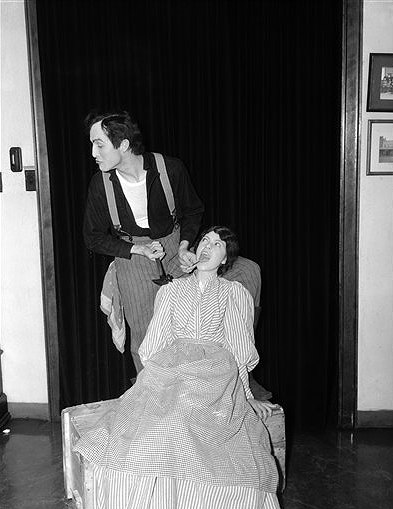
Tooth-jumping in rural Tennessee
Posted By: Alex - Thu Jun 08, 2017 -
Comments (4)
Category: Teeth
Elk Tooth Charm
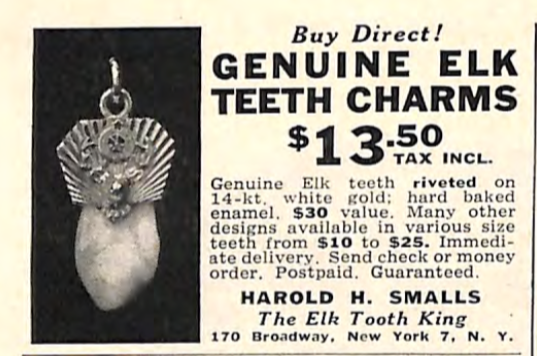
From the June 1948 issue of--what else?--the ELKS MAGAZINE.
Posted By: Paul - Sun Apr 16, 2017 -
Comments (0)
Category: Animals, Jewelry, 1940s, Teeth
Tooth Extraction and Marital Status
1930: Dr. C.F. B. Stowell, speaking to fellow dentists at the annual meeting of the American Dental Association, advised that if a young woman was unwed it would be better not to pull all her "devitalized teeth," because she "must be as beautiful as possible to secure a husband." But if the woman was married -- go ahead and pull those teeth!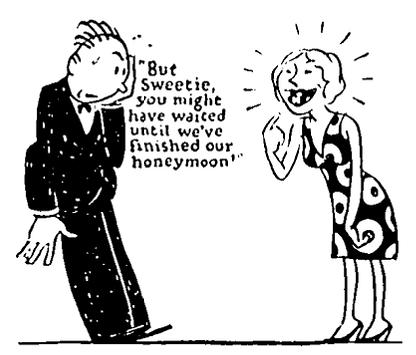
Life - Feb 14, 1930
Lurking behind this statement, I believe, was the idea of "Focal infection theory." According to this theory, which was widely held by dentists in the 1920s and 30s, infected teeth were responsible for a variety of diseases including arthritis, cancer, and mental illness. So if there was any suspicion that a tooth was infected, it was better to pull it. In fact, it was often better to pull all a patient's teeth, whether or not they showed any signs of problems, just to be safe.
From wikipedia:
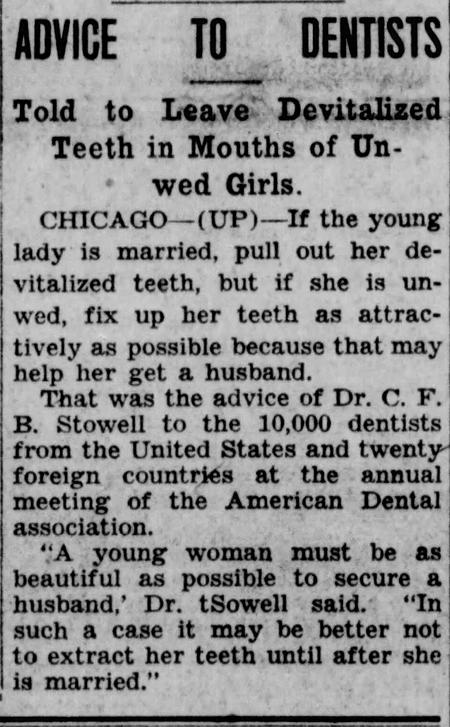
Lincoln Evening Journal - Jan 16, 1930
Posted By: Alex - Thu Apr 06, 2017 -
Comments (1)
Category: 1930s, Teeth
Follies of the Madmen #274
Horny beach bunnies switch instantly from thoughts of lust to thoughts of dental hygiene.
Posted By: Paul - Fri Feb 12, 2016 -
Comments (3)
Category: Business, Advertising, Products, Children, Parents, 1960s, Teeth

| Who We Are |
|---|
| Alex Boese Alex is the creator and curator of the Museum of Hoaxes. He's also the author of various weird, non-fiction, science-themed books such as Elephants on Acid and Psychedelic Apes. Paul Di Filippo Paul has been paid to put weird ideas into fictional form for over thirty years, in his career as a noted science fiction writer. He has recently begun blogging on many curious topics with three fellow writers at The Inferior 4+1. Contact Us |




